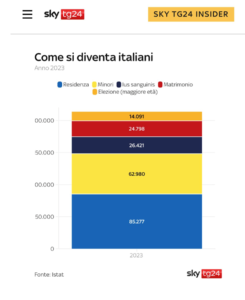Jump to other articles:
- LGBTQ-Friendly Countries and How to Move There
- Dissolution of the Portuguese Government: Why You Should Secure Your Portugal Golden Visa Now
- Why Americans Are Buying a Second Citizenship and Foreign Passport
- Antigua & Barbuda’s 2025 CBI: Key Insights from the CIU
- Portugal Golden Visa: New Timeline for Existing Applicants
The Tajani Decree And How To Fight For Your Italian Dual Citizenship

Your Italian Citizenship Is At Risk
Have you invested years collecting family documents, visited Italy to walk in your ancestors’ footsteps, or dreamed of reconnecting with your family’s homeland? Were you shocked to learn on March 29th that your right to Italian citizenship might have suddenly disappeared?
You’re not alone.
Thousands of Italian descendants worldwide have been blindsided by the abrupt implementation of Decree-Law no. 36/2025 (known as the Tajani decree). This law fundamentally changes who can claim Italian citizenship through ancestry. Those precious birth certificates from your bisnonni may no longer provide the pathway to citizenship you’ve been working toward.
But don’t give up on your heritage journey yet. This is a setback, not the end.
What The Tajani Decree Actually Does
On March 28, 2025, the Italian government enacted Decree-Law no. 36/2025, immediately changing citizenship rights that had remained stable for over a century.
Deputy Prime Minister Tajani introduced these severe restrictions to jure sanguinis (citizenship by bloodline) claims without any parliamentary debate.
The most significant change is this: Italian citizenship can now only be passed down for two generations and only under very specific conditions:
- Either your parent must have lived in Italy for at least two years, OR
- Your grandparent must have been born in Italy
This means descendants beyond the second generation cannot pass Italian citizenship to their children, effectively ending the Italian lineage of millions of families worldwide.
While applications submitted before March 27, 2025 (midnight) will still be processed under the previous rules, all new applications must meet these new requirements. Making matters worse, consulates worldwide have canceled all pending appointments without offering alternatives.
Further complicating matters, Tajani has announced plans to centralize all citizenship applications through a new office – one that doesn’t yet exist and might take years to become operational.
Why This Decree May Be Unconstitutional

This decree-law raises serious constitutional concerns for several reasons:
First, the Italian Constitution (Article 77) allows emergency decree-laws, but they must be ratified by Parliament within 60 days. But is there really an emergency regarding jure sanguinis citizenship? The evidence suggests otherwise.
According to ISTAT (the Italian National Institute of Statistics), only 12% of new Italian citizens in 2023 (about 26,421 out of 211,567) were people claiming citizenship through ancestry.
Furthermore, Italy faces a severe demographic crisis with historically low birth rates, increasing maternal ages, and longer lifespans. The Italian diaspora – people with a built-in connection to Italy – actually represents a potential economic and social benefit to the country, not a problem requiring emergency action.
Second, non-retroactivity is fundamental to Italian and European Union law. Can the government legally revoke citizenship rights overnight that millions of people believed they possessed? Should such dramatic changes occur without a reasonable transition period? Shouldn’t new laws only affect those born after the law takes effect?
These questions will likely reach Italy’s Constitutional Court for review.
How This Affects The Global Italian Community
The consequences go far beyond paperwork and legal technicalities. For millions with Italian ancestry, this is about identity, heritage, and connection to family roots.
Countless dreams now hang in limbo because of a hasty decree that has severed centuries of connection between Italy and its global diaspora.
Even native-born Italians living abroad face uncertainty about their children’s status. If an Italian citizen hasn’t lived in Italy for two continuous years before having a child abroad, that child may no longer be entitled to Italian citizenship.
Why You Should Still Pursue Your Case
Despite these challenges, we strongly recommend proceeding with your citizenship application. Here’s why:
- Parliamentary Review Opportunity: When Parliament converts the decree-law into permanent legislation in the coming weeks, they may amend it, potentially extending deadlines or modifying eligibility requirements. Already, some Italian politicians have openly disagreed with the decree-law.
- Constitutional Court Review: Italy’s Constitutional Court is scheduled to address citizenship matters in June 2025. Their ruling could establish principles that override portions of the current decree.
- Building Legal Precedent: The more cases challenging this decree that reach the courts, the greater the chance that a judge will refer the question to the Constitutional Court.
- European Human Rights Standards: If Italian courts fail to address the issue adequately, the European Court of Human Rights may eventually review whether the decree violates established principles regarding reasonable transition periods and acquired rights.
Your Heritage Is Worth Fighting For
If you’re reading this, you likely feel deeply connected to your Italian heritage. Perhaps you visit family in Italy frequently, speak Italian, have mastered traditional recipes, or are planning to permanently move.
This decree threatens to sever your legal connection to Italy, but it cannot take away your heritage or your right to fight for recognition.
Take Action Now
Here’s what you can do:
- Contact Latitude Immediately: Even if your documentation is incomplete, filing your case now may position you to benefit from future legal developments.
- Join advocacy groups fighting this decree. Collective action can influence parliamentary decisions.
- Contact Italian consulates and elected officials to express your concern about how this decree impacts Italian communities worldwide.
Remember the “1948 cases” precedent: For years, women couldn’t pass citizenship to children born before 1948. Through persistent legal challenges, this discrimination was eventually overturned. Your fight today could create similar progress.
Your Italian heritage is more than a passport—it’s your birthright. Don’t let a hastily enacted decree take it away without a fight.
This blog post provides general information only and is not legal advice. Please contact us today as a qualified Italian citizenship advisor for guidance specific to your situation.
 Back to News
Back to News